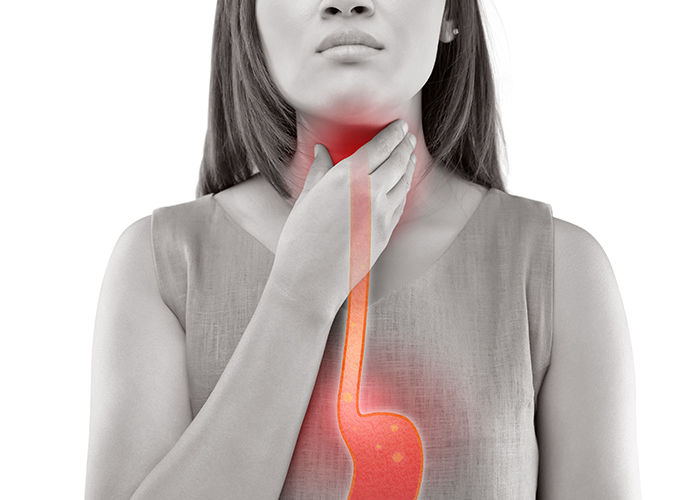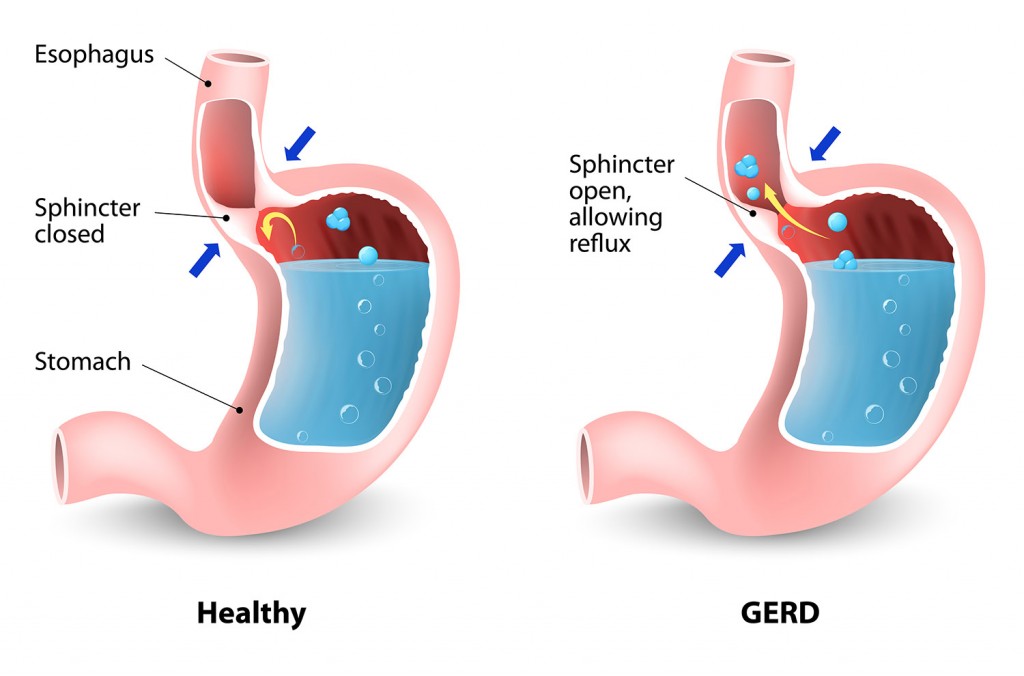Reflux is a digestive disorder in which stomach acid flows back into the esophagus. This process can cause unpleasant symptoms and, if it happens regularly, it can cause serious health problems. The stomach, which is part of the digestive system, produces the acid needed to digest food. The esophageal sphincter, a muscle between the stomach and esophagus, acts as a valve that allows food to pass from the esophagus to the stomach while preventing stomach acid from backing up into the esophagus.
When this muscle becomes weak or fails to close properly, stomach acid can back up into the esophagus, causing a burning sensation in the chest, commonly known as heartburn.
Reflux can occur at any age, but is more common in adults. Children, especially infants, can also experience reflux because their esophageal sphincter may be immature. This is usually a temporary problem that goes away as the child grows.
The symptoms of reflux can vary widely. Many people experience a burning sensation in the chest (heartburn), a sour taste in the mouth, or a sensation of food coming back up into the mouth. Others may experience difficulty swallowing, a chronic cough, voice changes, dry mouth, ear pain, or bad breath. Reflux can even cause a nighttime asthma attack if the acid reaches the airways.
For most people, reflux symptoms can be managed with lifestyle changes and medication. Dietary changes, stopping smoking, reducing alcohol consumption, losing weight and getting enough rest can reduce symptoms. Medications such as antacids, H2 blockers, and proton pump inhibitors can reduce stomach acid and help control symptoms.
However, long-term or inadequately treated reflux can lead to more serious health problems, such as Barrett's esophagus, in which the cells in the esophagus change and become similar to stomach cells, increasing the risk of esophageal cancer.
What are the characteristics of reflux?
Reflux is a disorder of the digestive system with certain characteristics that contribute to its identification and diagnosis.
Common symptoms: Reflux is typically characterized by heartburn, or a burning sensation in the chest that may spread to the throat and mouth, and a sour taste in the mouth, which is often most noticeable after eating or lying down. Other symptoms may include difficulty swallowing, cough, hoarseness, nausea, heartburn, and asthma, especially at night.
Frequency and intensity: Reflux symptoms can occur infrequently or frequently, and can vary in intensity from mild to severe. People who experience frequent or intense symptoms should consult a doctor, as this may indicate severe reflux.
Nocturnal symptoms: Reflux often occurs at night and can disrupt sleep. This feature is important because the lack of sleep caused by reflux can affect your overall health and quality of life.
Impact on quality of life: Reflux can have a significant impact on a person's quality of life, especially if symptoms are persistent or intense. These symptoms can make eating, talking, sleeping, and other daily activities difficult.
Complications: Long-term or inadequately treated reflux can lead to complications such as esophagitis, esophageal stricture, and Barrett's esophagus. Esophagitis is a condition in which inflammation and ulcers develop inside the esophagus due to constant exposure to acid. An esophageal stricture is a narrowing or constriction in the esophagus that can cause difficulty swallowing. Barrett's esophagus is a serious condition in which the cells inside the esophagus change in structure and become similar to stomach cells, increasing the risk of esophageal cancer.
Reasons
Reflux is caused by a combination of certain anatomical and lifestyle factors that disrupt the normal digestive system.
One of the main causes of reflux is dysfunction of the esophageal sphincter, a group of muscles located between the stomach and esophagus. This muscle group normally acts as a valve to prevent stomach acid from backing up into the esophagus. When this sphincter fails to contract properly, stomach acid can back up into the esophagus, causing reflux.
A hiatal hernia is a condition in which part of the stomach pushes through the diaphragm and into the esophagus. This can disrupt the function of the esophageal sphincter and cause reflux.
Lifestyle factors such as being overweight or obese, smoking, drinking alcohol, eating habits (such as eating spicy, acidic or fatty foods) and eating at night can increase the risk of reflux. These factors can increase the acidity of the stomach or cause changes in the tone of the esophageal sphincter.
Pregnancy is also a known cause of reflux. Hormonal changes, as well as increased pressure on the stomach as the fetus grows, can cause reflux.
Certain medications, such as nonsteroidal anti-inflammatory drugs (NSAIDs), certain antidepressants, calcium channel blockers, and certain asthma medications, can weaken the tone of the esophageal sphincter and cause reflux.
There are many reasons why reflux can occur and they can vary from person to person. It is important to understand that while some factors can be controlled (such as diet, smoking), others (such as genetics or pregnancy) cannot.
:max_bytes(150000):strip_icc()/Health-Acid-RefluxV3-fca294e95bbd423c8f3544e832c1dadf.jpg)
Reflux symptoms
Reflux is a digestive disorder characterized by several symptoms that can vary between patients and can affect different aspects of life.
One common symptom of reflux is heartburn, or a burning sensation in the chest area that can spread to the throat and mouth. Heartburn usually occurs after eating and can be worse when a person lies down or bends over.
Also known as heartburn, this symptom occurs when stomach contents back up into the esophagus and mouth, causing an unpleasant or even sour taste.
Some patients may experience difficulty swallowing or pain called dysphagia. This may be due to long-term damage to the esophagus from ongoing episodes of acid reflux.
Stomach acid entering the esophagus and throat can cause voice changes such as hoarseness and sore throat.
Reflux can cause a dry, persistent cough or breathing problems such as asthma or shortness of breath. These symptoms are more likely at night or while lying down.
Long-term reflux can cause oral problems, such as tooth enamel erosion, dry mouth, or bad breath, due to stomach acid entering the mouth.
All of these symptoms can have a serious impact on a person's quality of life, and untreated reflux can lead to serious complications such as esophagitis or Barrett's esophagus. If you experience any symptoms of reflux, you should consult your doctor.
How is reflux treated?
The treatment of reflux involves a wide range of different strategies, from lifestyle changes and pharmacological treatment to surgical intervention. However, the goal of treatment is to reduce symptoms, prevent complications, and improve quality of life.
The first line of treatment for reflux involves lifestyle changes. Patients may be advised to reduce spicy, acidic, fatty foods, alcohol, and caffeine, as these factors can cause relaxation of the esophageal sphincter. Patients may also be advised to eat smaller, more frequent meals, avoid eating before bed, and keep their head elevated while sleeping. Also, losing weight and stopping smoking can help reduce symptoms.
Medical treatment for reflux may include antacids, H2 blockers, and proton pump inhibitors (PPIs). Antacids such as magnesium hydroxide or aluminum hydroxide neutralize stomach acid and may be used for mild symptoms. H2 blockers such as ranitidine and PPIs such as omeprazole reduce the production of stomach acid and are usually more effective for more severe symptoms.
When treatment fails to control symptoms, surgery may be considered. Laparoscopic Nissen fundoplication is an operation in which the top of the stomach is wrapped around the bottom of the esophagus to strengthen the function of the esophageal sphincter. New endoscopic treatment methods such as transoral endoscopic esophageal sphincter placement surgery may also be used.
All of these treatments should be individualized to the patient based on the severity of their symptoms, overall health, and quality of life. It is important to emphasize that patients on long-term PPIs should be regularly monitored for possible side effects.
:max_bytes(150000):strip_icc()/VWH_illustration_Acid-Reflux-Sore-Throat-Remedies_Illustrator_Nez-Riaz_Final-aa0381fd078e43359fc8c5a00c7b85a5.jpg)
Reflux is a common gastrointestinal disease with several symptoms. Reflux occurs when the esophageal sphincter, the junction between the esophagus and the stomach, fails to function properly, allowing stomach acid to back up into the esophagus.
The causes of this disease are diverse and include both anatomical and lifestyle factors. In addition, certain medical conditions such as obesity, smoking and others can increase the risk of reflux. The symptoms of this disease can range from mild to severe and affect people's quality of life.
Treatment for reflux includes lifestyle changes, medications, and, in rare cases, surgical intervention. All of these methods must be individually tailored to each patient based on the severity of their symptoms, overall health, and quality of life.
Sources of information:
Mayo Clinic. (2021). GERD. https://www.mayoclinic.org/diseases-conditions/gerd/symptoms-causes/syc-20361940
El-Serag, H. B., Sweet, S., Winchester, C. C., & Dent, J. (2014). Update on the epidemiology of gastro-oesophageal reflux disease: a systematic review. Gut, 63(6), 871–880. https://doi.org/10.1136/gutjnl-2012-304269
Kahrilas, P. J. (2018). GERD pathogenesis, pathophysiology, and clinical manifestations. Cleveland Clinic Journal of Medicine, 85(11), 867–878. https://doi.org/10.3949/ccjm.85a.18013
Mayo Clinic. (2021). GERD. https://www.mayoclinic.org/diseases-conditions/gerd/symptoms-causes/syc-20361940
Ness-Jensen, E., Hveem, K., El-Serag, H., & Lagergren, J. (2016). Lifestyle Intervention in Gastroesophageal Reflux Disease. Clinical Gastroenterology and Hepatology, 14(2), 175–182.e3. https://doi.org/10.1016/j.cgh.2015.04.176
Katz, P. O., Gerson, L. B., & Vela, M. F. (2013). Guidelines for the Diagnosis and Management of Gastroesophageal Reflux Disease. American Journal of Gastroenterology, 108(3), 308–328. https://doi.org/10.1038/ajg.2012.444
Mayo Clinic. (2021). GERD. https://www.mayoclinic.org/diseases-conditions/gerd/diagnosis-treatment/drc-20361959
Spechler, S. J., & Souza, R. F. (2014). Barrett's Esophagus. New England Journal of Medicine, 371(9), 836–845. https://doi.org/10.1056/NEJMra1314704
# refliuksas


